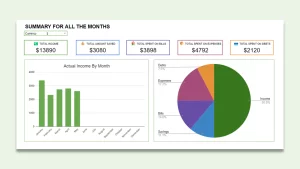
10 Most Important Things to Know About Personal Finance
Personal finance covers a wide range of topics, but some important things to know include Budgeting, Saving, Investing, Managing debt, Planning for retirement, and so on.
Here are 10 most important things you need to know about personal finance:
BUDGETING
Creating and sticking to a budget is crucial for managing your finances effectively. This involves tracking your income and expenses to ensure you’re living within your means.
It will help you to understand where your money is coming from and how it is being used.
For example, if your monthly income is $3,000 and your expenses total $2,500, you have $500 left over for savings or discretionary spending.
You can use a free budgeting spreadsheet like this one to help you stay on top of your finances.
EMERGENCY FUND
Building an emergency fund provides a financial safety net for unexpected expenses or income disruptions.
Life and everything that goes on around us are hugely unpredictable, having an emergency fund is like a superpower when everything around is shaking.
Aim to save three to six months’ worth of living expenses in an easily accessible savings account. You will be happy you did this.
DEBT MANAGEMENT
Minimizing and effectively managing debt is essential for financial health. This includes understanding interest rates and paying off high-interest debt first.
Prioritize paying off credit card debt with high-interest rates before tackling lower-interest student loans.
Using a mobile app like Codlixe can help you track and manage your debts in a simple and motivating way.
SAVING FOR RETIREMENT
Start saving for retirement as early as possible to take advantage of compound interest and ensure a comfortable future.
Contributing regularly to a 401(k) or IRA can help build a substantial retirement fund over time.
INVESTING
Investing is key to building wealth over the long term. Understand different investment options and risk levels to make informed decisions.
Investing in diversified index funds or ETFs can offer steady returns with lower risk compared to individual stocks.
Other investment options like Peer-to-peer investment can be very helpful when you are getting started.
You can also use Codlixe to help you track your investment.
INSURANCE COVERAGE
Having appropriate insurance coverage protects you financially against unexpected events such as illness, accidents, or property damage.
Health insurance can help cover expensive medical bills in case of illness or injury, preventing financial strain.
TAX PLANNING
Understanding how taxes impact your finances and utilizing tax-efficient strategies can maximize your savings and investments.
Contributing to a retirement account like a 401(k) or IRA can reduce taxable income and lower your tax bill.
FINANCIAL GOALS SETTING
Setting clear financial goals helps guide your financial decisions and motivates you to save and invest wisely.
Saving for a down payment on a house, funding a child’s education, or taking a dream vacation are all common financial goals.
CONTINUOUS LEARNING
Stay informed about personal finance topics, including investing strategies, economic trends, and financial planning techniques.
Reading books, attending seminars, or following reputable financial websites can help you stay updated and make informed decisions.
REGULAR REVIEW AND ADJUSTMENT
Regularly review your financial situation and adjust your strategies as needed to accommodate changes in income, expenses, or goals.
Make sure to revise your budget or investment portfolio annually to reflect changes in your financial situation or market conditions.
By understanding and implementing these principles, you can build a solid foundation for managing your personal finances effectively and achieving your long-term financial goals.


